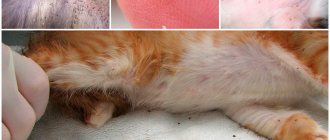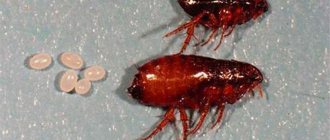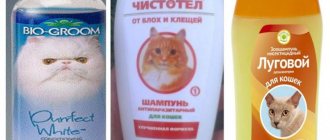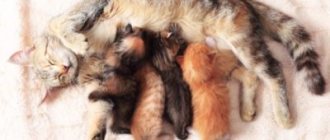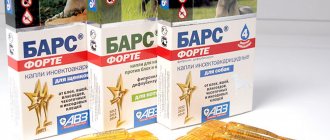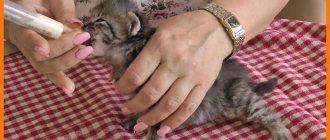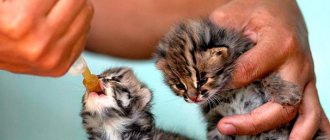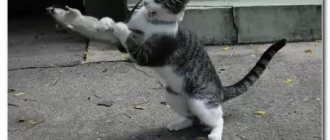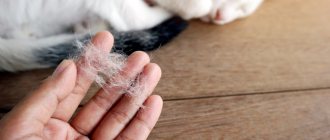Symptoms of the presence of “living creatures”
Fleas, lice, lice and other living creatures are quite frequent guests of pets. And even if the cat has never left the apartment, insects can settle on the animal if they get into the room with the shoes and clothes of household members.
An experienced owner treats the coat against fleas before mating the animal. However, trouble often happens after mating, during the pet’s pregnancy. Signs of parasite infection do not appear immediately. At first, the animal’s behavior is unremarkable, however, as the number of “tenants” increases, the symptoms also increase.
The owner begins to notice that his pet is behaving restlessly: she often bites herself, literally bites into the skin, and becomes nervous due to bites and itchy skin. Most often it itches in the head, abdomen and at the base of the tail. Often, the owner may notice that the cat meows and immediately begins to itch. Upon examination, traces of scratching and crusts of dried blood are visible on the skin. You should know that even a thorough examination of the skin does not always allow visual identification of parasites. But traces of their presence (excrement in the form of dry dark crumbs between the hairs) are not difficult to detect.
If a pregnant cat has fleas, what should you do in this situation? The answer to this question is clear: parasites must be destroyed before birth.
What happens if a cat licks flea drops
Many owners of furry pets wonder what will happen if a cat licks flea drops. The situation is especially alarming when the kitten licks the product. It is impossible to say that there is no cause for concern. But you shouldn’t worry too much about this if you react correctly to what happened.
Danger of droplets - theory
Effective flea treatments for cats contain insecticides. The substances belong to a low hazard class and, when used correctly, do not affect the well-being of the animal. However, the instructions below indicate that if there is an individual intolerance to the components, a number of side effects occur:
It is this large list of side effects that makes you worry if your cat has taken flea drops. The whole difficulty lies in the fact that you can find out about the presence of individual intolerance in cats only after using the drops.
Careful use
Manufacturers use insecticides of a certain dosage to make their products. A minimal amount is enough to poison insects, but the dose remains safe for cats.
The fact that it is recommended to drip in places inaccessible for licking is alarming: the area of the withers between the shoulder blades, along the spine. However, these recommendations relate more to the effectiveness of the product than to the safety of cats.
All modern drops for cats work the same way. Within 2 hours they are absorbed by the skin, localized in the hair follicles and sebaceous ducts. If the drops are licked off and do not have time to be absorbed, protection against fleas cannot be called complete.
Danger of droplets - practice
Cat poisoning with flea treatment can occur, but certain factors must contribute to this.
Manufacturers could not help but take this situation into account and have complete confidence. Source
Source
I’m sooooo afraid for my pussy, please help someone who has experience. maybe something to drink. enterosgel. cream in a higher dose. She always drinks water poorly - maybe through a syringe?
To calm the soul, give her 2-3 days an hour and a half before meals 1/2 tsp of Enterosgel 3 times a day, you can inject Gamavit 1 ml subcutaneously during the same days. It won’t make things worse, but it helps with intoxication
PlushkoMama
, why did you decide that the cat got wet? Are there any signs? This drug is very bitter, you lick it a little and you immediately begin to drool heavily. It is for this reason that it is better not to use it if there are several animals in the house, but then it is absorbed and everything is fine. Don’t worry, the cat won’t lick it off much, it will be disgusting for her)))
I read this about frontline. but nowhere about this drug. Bun didn't have any salivation. She just winced and licked herself three times after touching the fur with her tongue.
Cats salivate in streams or foam at the mouth from anything bitter. This is not necessarily poisoning; bitter medicines have the same reaction
I also wanted to ask what effect does enterosgel have? Is it not for stomach poisoning? Advantage doesn't get there or am I misunderstanding?
Enterosgel cleanses the liver. You do not have poisoning, at least at the moment there are no signs of it. I think that there is no need to wash the cat, mine also tried to hide for the first few hours after treatment and was offended at me for the unpleasant smell, but everything quickly passed.
Why not wash it? the product remains on the wool. If I take off my jacket, she’ll lick everything there. Or does the product lose its toxicity after some time?
PlushkoMama
, actually, it is applied to the skin by spreading the fur, then you can rub it in lightly. Almost nothing remains on the wool, and the smell disappears after about half a day.
I parted the fur
Source
Why do fleas need to be removed?
External parasites are more than just a nuisance for your pet. Cat fleas pose a real threat to animal health:
- carry worm eggs;
- contribute to the infection of animals with viral, bacterial and fungal infections;
- lead to allergic dermatitis;
- promote hair loss, baldness;
- lead to infection and inflammation of the affected areas;
- cause anxiety to the animal and increase nervousness;
- cause anemia and emaciation in newborn kittens.
Having discovered parasites in a pet, the owner must immediately take measures to destroy them.
We recommend reading the article about helminthiases (worms) in cats and dogs. From it you will learn about different types of helminths in domestic animals, symptoms of their parasitism, prevention and treatment measures.
How to remove fleas from a cat? Simple rules
Along with flea medications, give your pet anthelmintics.
Fleas are often carriers of worms; while getting rid of some parasites, one should not forget about others. Be sure to carry out preventive maintenance once every 3 months for animals that are at home, once every 2 months for those in contact with other cats and those walking on the street. You should not bathe your pet for three days after treatment. It is very important to use products intended only for cats. Before giving tablets or using drops to treat a small kitten or pregnant or nursing cat, consult a veterinarian. Do not let your pet lick itself for half an hour after treating its fur and skin with flea products. Treat not only the animal, but also the places where it is most often found. The main thing is to know that timely assistance to your beloved animal can prevent the occurrence of serious problems that can be caused by cat fleas
It’s a pity that our pets can’t talk, so they could tell us what’s bothering them. Take care of your pet, because we are responsible for those we have tamed. Be sure that he will definitely respond in kind to your attentiveness and love. Health to you and your pets!
The main thing is to know that timely help for your beloved animal can prevent the occurrence of serious problems that can be caused by cat fleas. It’s a pity that our pets can’t talk, so they could tell us what’s bothering them. Take care of your pet, because we are responsible for those we have tamed. Be sure that he will definitely respond in kind to your attentiveness and love. Health to you and your pets!
Treatment for parasites of a pregnant cat
Treating a pregnant cat for fleas is associated with the risk of exposure of her body to toxic substances and insecticides used for these purposes. A pregnant pet is the most sensitive and susceptible to the effects of harmful substances. In addition, some insecticidal preparations can be absorbed into the blood and lead to negative consequences: miscarriages, the birth of non-viable or dead offspring. Therefore, the procedure for removing fleas from a pregnant woman should be approached responsibly, following the following recommendations:
- Before carrying out the procedure, you must consult a veterinary specialist who will advise how to treat a pregnant cat against fleas and help you choose an effective but safe drug;
- the bedding on which the pet sleeps must be boiled or changed;
- before using any form of insecticide (shampoo, drops, etc.), the animal must be thoroughly combed, first with a wide-toothed comb, and then with a fine-toothed one;
- before processing, you should vacuum the furniture, carpets, floor coverings, then throw away the replacement bag or thoroughly rinse the vacuum cleaner container;
- perform the procedure strictly in accordance with the instructions for the drug;
- After treating the animal, it is necessary to disinfect the premises, paying special attention to the hallway, front door, and the pet’s favorite places.
Compliance with the rules for using drugs, preparing the animal, and cleaning the premises will allow you to deal with the problem effectively, quickly and safely.
Folk remedies
The use of folk remedies does not harm the cat’s well-being, and some of them, on the contrary, have a calming effect on the nervous system.
Sagebrush
Safe and effective product. Suitable for nursing, pregnant cats and kittens.
Decoction:
- 20 g of dry leaves or 40 fresh;
- half a liter of water.
Boil for 20 minutes. Cool, strain, lubricate the fur and skin of the animal.
Tincture:
- Wormwood - 10 g;
- Eucalyptus - 10 g;
- Lavender - 10 g;
- Tansy - 10 g;
- Water - 1 liter.
Boil for 20 minutes. Leave for 10 hours. Treat the animal with the finished tincture for 8-10 days.
An excellent folk remedy is pine sawdust. They are scattered at the entrance to the house, stuffed with them into a pillow or mattress on which the cat likes to rest. The advantage is a pleasant smell and prevention of re-infection.
Vinegar
Both the parasites and the cats themselves do not like its smell. But if you mix vinegar and ammonia with any cologne in equal proportions, you will get a powerful, effective remedy. It is poured into a spray bottle and the animal’s fur is treated. Wrap in plastic, leaving the head outside.
After holding the pet for 7-10 minutes, comb out the fur, removing dead insects and their eggs. This method is not suitable for pregnant and lactating cats, as well as kittens. It is designed for a calm and patient animal.
Garlic
To get rid of insects, you can prepare garlic tincture:
Pour 5 large crushed cloves into four glasses of water (23°C). Leave for 10 hours. Add 2 teaspoons brewer's yeast. Use the resulting extract to wipe the animal’s fur in places where the pet cannot reach.
Try to prevent the prepared product from getting into the stomach and eyes.
Essential oils
The safest product based on water and oil. Suitable for kittens, pregnant and lactating cats. Can be used:
- rosemary oil;
- mint;
- cedar;
- lemon;
- geraniums;
- fir;
- lavender.
To prepare a water-based product, three drops per glass is enough. The resulting liquid is poured into a spray bottle and sprayed on the animal. Essential oils are also added to shampoos and applied to the collar.
Homemade shampoo
A homemade detergent guarantees the death and escape of parasites. To prepare it you will need:
- crushed baby soap (1/4);
- medium sized onion;
- water (0.2 l).
Pour warm water over the soap shavings and boil until they turn into jelly. Cool and mix with grated onion. Add your choice: egg yolk, calendula tincture, nettle infusion or essential oil. Lather the animal with the resulting product and wrap it in polyethylene for 20 minutes.
Then rinse off the shampoo and comb your pet's fur.
Geranium decoction
To prepare you will need:
- geranium - 30 g;
- lavender - 30 g;
- water - 750 ml.
Boil for 15 minutes, cool, strain and pour into a spray bottle.
Make sure that the resulting decoction does not get into your eyes.
